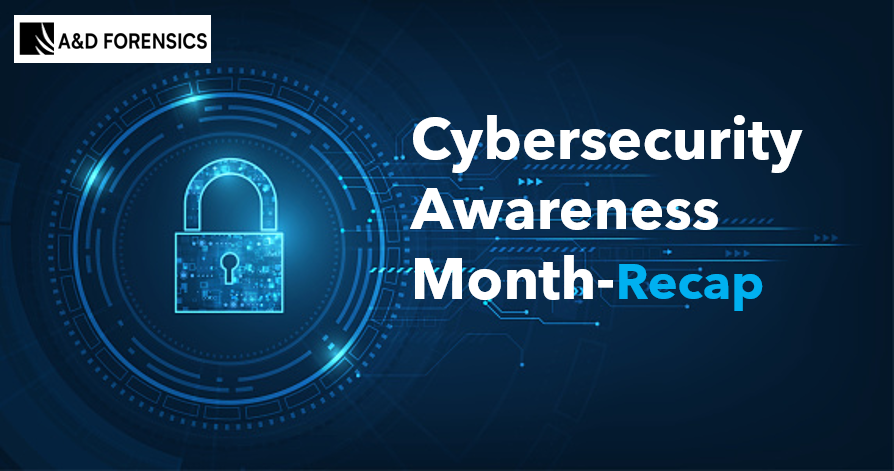Cybersecurity Awareness Month: A Recap of
The Do’s
The aim of cybersecurity awareness month is to enlighten the general public on how to stay safe online or when interacting with a digital device. This article seeks to give an overview of requirement needed to stay protected on internet as highlighted by CISA (Cybersecurity and Infrastructure Security Agency) as co-led by NCA(National Cybersecurity Alliance) for the 2022 cybersecurity awareness month.

The theme for 2022 is coined as #SeeYourselfInCyber, which basically is advising every individual and organisation to be responsible for keeping themselves as well as there infrastructure safe while in the cyberspace or using any device that has access to internet
Below are the four points highlighted during the cyber security awareness month campaign.
Enable Multi-Factor Authentication
Multi-factor authentication, frequently referred to as MFA, is also known as two-factor authentication or two-step verification. MFA is a security feature for an account (on social media or a banking application), Digital assets (e.g., wallets) that require many kinds of identity verification from a user before granting access.
The idea behind MFA is that the data or channel that the data passes through has to be personal (for example, an SMS to your personal phone or email) a security question such as “What is the name of your favourite food”. You typically enter your login information and password before proving your identity in another way, such as a fingerprint scan or an SMS with random characters or a string as well as submitting an answer to a security question. Receiving mail or messages containing random numbers or alphanumeric characters that must be entered into a box is the most common and widely utilised method.
It’s important to note that applications with MFA in place have been breached either due to a mistake in writing of the code or a bad business logic vulnerability, 2FA authentication does not provide 100% security (there is no such thing as 100% security). However, when MFA is combined with other security measures,such as a very strong or complex password among others, it does make it twice as difficult for the adversary to breach your account or digital profile.
Passwords and Password Managers
Passwords can be likened to an individual’s access key to his or her digital castle.
For almost everyone that uses the internet, creating, storing, and remembering passwords may be a hassle. However, passwords are really your first line of protection against hackers and data breaches. Additionally, free, user-friendly password managers make managing your passwords simpler than ever.
Regardless of what a password is protecting, it is recommended that the password is unique, complex and long.
Unique: A password should be unique to its creator, such as that it’s easy to remember but hard for anyone else to guess.
Complex: A complex password should be a combination of three among the following, An uppercase letters, lowercase letters, numbers, special characters.
Long: A password is considered long when it has at least 12 characters, this makes it difficult to guess
Password managers take away the need to remember every unique password created, once you create your portfolio on any platform it’s saved immediately with your password manager, it also makes it easy to login when needed.
Some examples of password managers include Lastpass, 1Password, Nordpass e.t.c.
Updating Software
While adhering to all the recommendations above it’s important to take care of the application within your system. This is because they serve as an attack vector when they happen to have a loophole within them which the vendor may have discovered and fixed. If you don’t apply these fixes, you become exposed to malware and viruses sometimes tailored towards those applications.
It’s best to make software updates automatic (If the option is available) as this ensures you are getting it from the right source. If automatic update is not available, ensure you are downloading from the right source and avoid cracked and pirated copies of software as this is the quickest way your system can get compromised, this is because this type of application can be embedded with malware’s.
Recognizing Phishing: Watch Out for Baits
Phishing is the practice of cyber criminals using phony emails, social media postings, or direct messages to get you to click on a dangerous link or download a harmful attachment. You can end up providing your confidential information to online thieves by clicking on a misleading link or file. Additionally, a phishing scam might infect your device with malware.
The Bait
The bait used during a phishing campaign by criminals, especially inexperienced ones, are usually shiny and too good to be true, this could be in the form of an email message, a text message notification saying you’ve won a large sum of money or an expensive device(e.g Iphone). You are now required to click on a link to claim you win. This link potentially harvests your personal information and credentials or worse, infect your device with malware.
The best action to take when you receive a phishing mail is to firstly block the email sender’s address and delete such message. One should never click on links or download attachments from a suspected phishing mail, in the case of an organization, the IT department should be notified of this type of email so that necessary measures can be taken.
These are some of the activities that ensure an individual or organization is, to a large extent, secured from the various dangers that come with interacting with the internet.
Thanks for reading
Follow us on LinkedIn, Twitter, and Facebook to get our daily updates.



